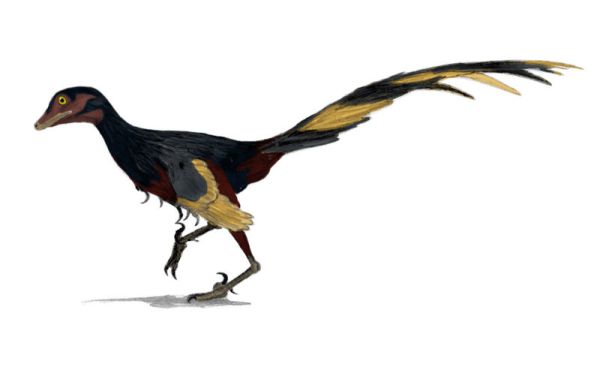
| Palaeos |  |
Coelurosauria |
| Vertebrates | Troodontidae |
| Page Back | Unit Home | Unit Dendrogram | Unit References | Taxon Index | Page Next |
| Unit Back | Vertebrates Home | Vertebrate Dendrograms | Vertebrate References | Glossary | Unit Next |
|
Abbreviated Dendrogram
DINOSAURIA |--ORNITHISCHIA `--+--SAUROPODOMORPHA `--THEROPODA | `--COELUROSAURIA |--Tyrannosauroidea `--+--Ornithomimosauria `--+--Maniraptora |--Therizinosauroidea `--Metornithes |--Alvarezsauridae `--+--Oviraptorosauria `--Paraves |--Deinonychosauria | |--Troodontidae | `--Dromaeosauridae `--Avialae |--Scansoriopterygidae `--AVES |
Contents
Index |
 The Archaeopteryx-like troodont Jinfengopteryx elegans, from the Early Cretaceous of China. Artwork by Matthew Martyniuk, via Wikipedia, GNU Free Documentation/Creative Commons Attribution Share Alike |
Troodontidae: Byronosaurus, Saurornithoides, Sinornithoides, Sinovenator, Troodon.
Range: Early Cretaceous (Late Jurassic?) to Late Cretaceous of China and North America.
Phylogeny: Deinonychosauria : Dromaeosauridae + *
Characters: ~2m long; skull long & low; premaxilla forms dorsoventrally flattened internarial bar [M+03$]; maxilla with broad shelf which contributes to palate; enlarged elongate maxillary fenestra; maxilla broadly contacts naris; nasals narrow posteriorly; skull roof peaks over orbits; $ sharp sagittal crest; quadrate pneumatic, with pneumatopore on posterior face [M+03$]; occiput, basal tubera reduced & located directly below occipital condyle, close to midline [M+03$]; basisphenoid without ventral pneumatic recess [M+03$]; laterosphenoid, postorbital process with possibly pneumatic pit [M+03$]; large brain; lateral depression for middle ear; elaborate craniofacial sinus system; inflated parasphenoid (contra [M+03); jaw symphyses narrow but U-shaped; dentary foramina inside lateral groove which does not reach symphysis [M+03$]; large number of teeth on maxilla and and dentary (~100 total) [M+03$]; interdental plates absent; somewhat heterodont, with anterior teeth smaller and more chisel-shaped (posterior teeth are typically theropod); anterior dentary teeth in continuous groove, with alveoli confluent [M+03$]; teeth bear posterior serrations (also anterior serratrions in some spp.) (contra [M+03]: not in Byronosaurus); most distal posterior serration forming tip of tooth; $ teeth with constriction between root & crown; teeth with large hooked denticles (may be absent from basal forms [M+03]) (functional significance of these unusual tooth characters is unknown); all vertebrae except distal caudals bear well-developed pockets for attachment of interspinous ligaments (absence on caudals may be $); trunk vertebrae with long, slender transverse processes [M+03$]; 6 sacral vertebrae; distal caudals with neural groove & no spine; transverse processes also absent from distal caudals; elongate caudal pre-zygapophyses; chevrons flattened in distal caudal (tail stiffened?); strap-like scapula with small acromion process; coracoid bears prominent biceps tubercle; pubic foot longer anterior to the shaft; $ lateral knob-like trochanter on femur; fibula reduced to splint; $ fusion of astragalus and calcaneum; tall ascending process of astragalus; $ laterally compressed metatarsal II, markedly shorter than Mt III & IV; long, strongly arctometatarsalian III; metatarsal IV stout; tongue-like extension of articular surface on metatarsal III; $ modified pes II allowing retraction of enlarged ungual (?); since second ungual normally retracted, foot functionally two-toed.
Links: DD: Troodon; National Geographic Magazine: July 1996 @ nationalgeographic.com; Troodontidae (rather dated UCMP page); Troodontidae -- The Dinosauricon; Re- Troodontidae (misfits); Troodontidae and All That Jazz; Troodontidae (Mikko's Phylogeny).
References: Makovicky et al. (2003) [M+03].
| Page Back | Unit Home | Page Top | Page Next |
checkedATW040810